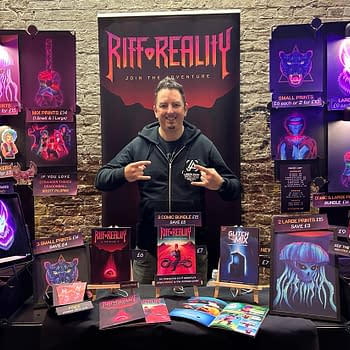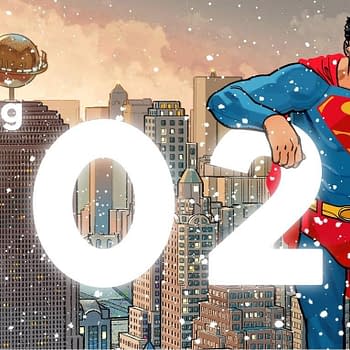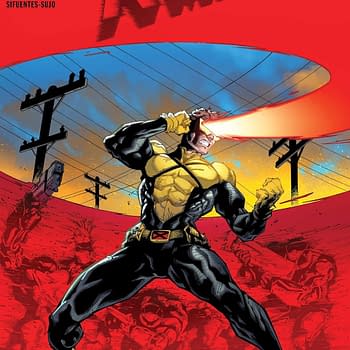Posted in: Comics | Tagged: Alan Moore
Alan Moore On His "Grouchiness" and "Cantankerousness"
Whenever I discuss the work and reputation of Alan Moore, I am usually smacked up against a wall of online commentators who tell me how gloomy he is, how morose he is, and why does he keep whining about the past. Which is utterly at odds with the man I've met, occasionally interviewed and even more occasionally drunk with. Who is good-humoured, witty and, above all, self-deprecating. But this is when he is speaking, and when you can hear it in his tone – something which vanishes when someone else takes those words and types them up. Which is why, when reading a spoken-word interview with Alan Moore, I always urge people to listen to his voice first, to get used to the ebbs and flows, before reading his words. Listening to Stewart Lee interview Alan Moore and then Alan Moore interview Brian Eno for BBC Radio 4's Chain Reaction is always a good start.
Anyway, the Alan Moore World blog has taken the occasion of Alan Moore's birthday to publish a full English-translated version of an interview by Raphael Sassalki and Alan Moore, published in a reduced version online by Folha de São Paulo. And has him react in part to the way he is sometimes portrayed.
First, when asked about the superhero comic books with which he is most associated with and which have been turned into movies and TV shows without his consent or authorisation;
I'm afraid that for a few years now, I have felt that since I am apparently not allowed to own the work that I created in the same manner that an author in a more grown-up and worthwhile field might expect to do, and since my protests at having my work stolen from me are interpreted by a surely young-at-heart and non-unionised audience as evidence of my "grouchiness" and "cantankerousness", then the only active position that is left to me is to disown the works in question. I no longer own copies of these books and, other than the earnest creative work that I put into them at the time, my only associations with these works are broken friendships, perfectly ordinary corporate betrayals and wasted effort. Given that I will certainly never be reading any of these works again and that I have no wish to see them or even to think of them, it follows that I don't wish to discuss them, sign copies of them or, indeed, have anything to do with them. As I would hope should be obvious, to separate emotionally from work that you were previously very proud of is quite a painful experience and is not undertaken lightly. However, having to answer questions about my opinions regarding DC Comics latest imbecilic use of my characters or stories would be much more harrowing. And, of course, it's not as if I don't have plenty of current work to be getting on with.
And when asked about heroic fiction as a whole,
I think the impact of superheroes on popular culture is both tremendously embarrassing and not a little worrying. While these characters were originally perfectly suited to stimulating the imaginations of their twelve or thirteen year-old audience, today's franchised übermenschen, aimed at a supposedly adult audience, seem to be serving some kind of different function, and fulfilling different needs. Primarily, mass-market superhero movies seem to be abetting an audience who do not wish to relinquish their grip on (a) their relatively reassuring childhoods, or (b) the relatively reassuring 20th century. The continuing popularity of these movies to me suggests some kind of deliberate, self-imposed state of emotional arrest, combined with an numbing condition of cultural stasis that can be witnessed in comics, movies, popular music and, indeed, right across the cultural spectrum. The superheroes themselves – largely written and drawn by creators who have never stood up for their own rights against the companies that employ them, much less the rights of a Jack Kirby or Jerry Siegel or Joe Schuster – would seem to be largely employed as cowardice compensators, perhaps a bit like the handgun on the nightstand. I would also remark that save for a smattering of non-white characters (and non-white creators) these books and these iconic characters are still very much white supremacist dreams of the master race. In fact, I think that a good argument can be made for D.W. Griffith's Birth of a Nation as the first American superhero movie, and the point of origin for all those capes and masks.
And regarding the industry as a whole,
I'd imagine that after these last three questions, my feelings (such as they are) about the comics industry at this point would be fairly obvious. Other than finishing my commitments to those publishers such as Knockabout, Avatar and Top Shelf who have always treated me well, I don't want anything to do with the comic industry in future. I still respect and love the comic medium and may very well work in the medium at some future point, but I genuinely want to put my connections with a comic industry that appears to me to be hopelessly dysfunctional far, far behind me.
The full interview talking about the strangest moments in his life, his work on Jerusalem, his political beliefs and love for the comic book Herbie can be read here. Another declaration of interest, Bleeding Cool is published by Avatar Press. Alan Moore's work with Kevin O'Neill, League Of Extraordinary Gentlemen concluded this year, published by Top Shelf/Knockabout and Cinema Purgatorio by Avatar Press. He has been working on his first feature film, The Show, with Mitch Jenkins, to be released next year.
















